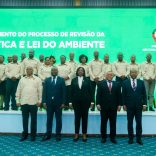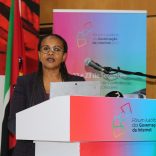CPLP: Mozambique MPs ask for reopening of Guinea-Bissau parliament, but pledge non-interference
Frelimo, Renamo differ on new elected governors’ powers

Frelimo, the ruling party in Mozambique, and Renamo, the largest opposition force, differ in their views of the powers and duties attributed to provincial governors to be elected under of the upcoming new decentralisation law, yet to be approved by the Assembly of the Republic.
The problem has to do with the alleged conflict of functions and tasks between the provincial governor-elect and the figure of Secretary of State to be appointed by the President of the Republic.
For Rasaque Manhique, Frelimo chief whip in Maputo Municipal Assembly and party spokesperson at the decentralisation public debate, there is no reason to call into question the merits of the draft law presented by the state. The ruling party further believes that there should be no mistrust regarding the figure of the Secretary of State, who will watch over matters clearly related to national sovereignty.
Manhique argues that the provincial governor will have space to exercise power and develop activities assigned by law and that the secretary of state will also have a field of action duly delimited, and that all arguments pointing to a conflict [of powers] between these two entities are mere speculation.
“The allegations that the duties of the Secretary of State are confused with those of the Provincial Governor are unfounded,” he said.
“We do not see any problem in this. We must realise that there are state interests that must always be protected and defended. That is why the draft law provides for the appointment of a secretary of state [in each province]. The two figures can and should work in coordination so that, together, they can contribute to development,” Manhique said.
Renamo deputy of the Assembly of the Republic and member of the Committee on Constitutional Affairs Human Rights and Legality Izequiel Molde Gusse ripostes that the draft law has some shady areas and leaves the perception that we will be watching a dual administration at the province level.
Renamo states that there is a tendency to cut off the governor’s freedom of action, and while from the decentralisation point of view the state element is necessary, the government’s proposal almost completely withdraws a governor’s current powers, handing them over to an un-elected figure.
“Sovereignty resides in the people, hence it does not make sense for an un-elected and centrally appointed personality to create a sort of impediment to the governance of the one who was elected. This raises the question of legitimacy of the figure of the secretary of state,” said Gusse.
“Renamo argues that it is not possible to create a parallel structure for a territorial area in which there is one who is sovereignly elected, [his powers] deriving from the will of the residents of that territorial constituency. The picture, so far, is not perfect. That is why we have made progress with these contributions,” he said.












Leave a Reply
Be the First to Comment!
You must be logged in to post a comment.
You must be logged in to post a comment.